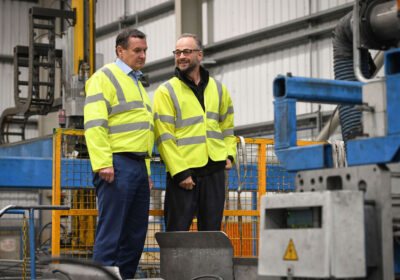Mobilityways published its 48-page ‘Road to Net Zero Study’ this week. The report encapsulates findings from a nine-month investigation of large UK organisations’ progress in addressing decarbonisation in their operations and along their supply chains.
A new multi-sector UK national study, commissioned by employer commute solutions specialist Mobilityways, has found that large UK-based advanced, civil and automotive engineering businesses trail similarly sized businesses in both the healthcare and financial services sectors in terms of both setting interim goals to reach Net Zero and establishing long-term targets to achieve carbon neutrality.
The new Mobilityways study found that the engineering sector lags both the financial services and the healthcare sectors in terms of setting ‘a target date for achieving carbon neutrality (i.e., having a commitment for reducing carbon dioxide emissions and balancing any remaining carbon emissions through removals)’. 57 per cent of engineering firms had set a date for carbon neutrality, whereas in both the healthcare and financial services sectors 61 per cent of firms have set a carbon neutrality target date.
In addition, less than half (45 per cent) of large engineering firms had established ‘some or all short and medium term milestones to help achieve Net Zero’, whereas 65 per cent of the financial services sector had published their Net Zero roadmaps.
Engineering Sector lags on Scope 1, 2 and 3 data collection & reporting
The engineering sector also lags others in the three sector Mobilityways study, in terms of going live with Scope 1, 2 and 3 Greenhouse Gas (GHG) emissions data collection and reporting. Meanwhile, just half (50 per cent) of large engineering firms had started implementing Scope 1 and 2 ‘direct’ emissions reporting, while 62 per cent of healthcare sector respondents had begun ‘direct’ environmental reporting.
The engineering sector is also behind other sectors in terms of the more impactful Scope 3 ‘indirect’ emissions reporting in companies’ supply chains. Just over half (54 per cent) of engineering firms have begun collecting Scope 3 emissions numbers; this compares poorly with both the financial services and the healthcare sectors where 71 per cent of equivalent-sized firms had started Scope 3 emissions reporting. Yet experts predict that Scope 3 emissions are likely to be responsible for at least 70 per cent of a typical firm’s total GHG emissions.
Exploring more deeply the progress of the 54 per cent of large engineering firms which have begun Scope 3 emissions data gathering, the Mobilityways study found that here too they were behind on specific emissions category levels. For example, only 41 per cent of these engineering firms have ‘worked out a way of measuring GHG emissions from employee commutes to their place of work’.
Employee commuting is one of 15 categories of ‘indirect’ Scope 3 emissions which need to be collected and reported on. In the financial services sector, 54 per cent of companies have worked out a method of capturing employee commute emissions data. Yet Scope 3 reporting disclosure is already required for engineering firms wishing to tender for UK public sector contracts worth over £5m.
The reality is the engineering sector is working hard on developing renewable energy systems, using low-carbon construction materials such as timber, and electrifying transport networks. It’s also innovating in areas like natural carbon capture in communities by introducing more trees and green spaces into new developments.
However, concrete production alone is a massive emitter of carbon dioxide (CO2). In fact, it is responsible for eight per cent of the worlds CO2 emissions. Just 100m3 of fresh concrete emits 31.6 tonnes of GHGs, equivalent to six years of the average UK resident’s carbon footprint.

Julie Furnell, Managing Director of Mobilityways, commented:
“The engineering sector has arguably been responsible for more carbon emissions than any other sector as it has invented and built much of the infrastructure that we all benefit from today. It also has the skills and knowledge to make the changes to our built environment to protect us from the worst effects of climate change over the next 30 years, and to decarbonise the way we build infrastructure and generate electricity longer term.
“However, in its quest to make these important changes, the sector must remain mindful of meeting its own carbon reduction targets in ways that might seem less significant but nevertheless constitute important sources of GHGs, such as emissions from their employees’ commutes to their places of work.”
Mobilityways’ full ‘Road to Net Zero Study’ can now be downloaded here: https://www.mobilityways.com/insights/road-to-net-zero-study.
Findings from the UK’s largest privately-owned construction firms are here: https://content.mobilityways.com/hubfs/Reports/Road%20to%20Net%20Zero%20Construction%202023.pdf








